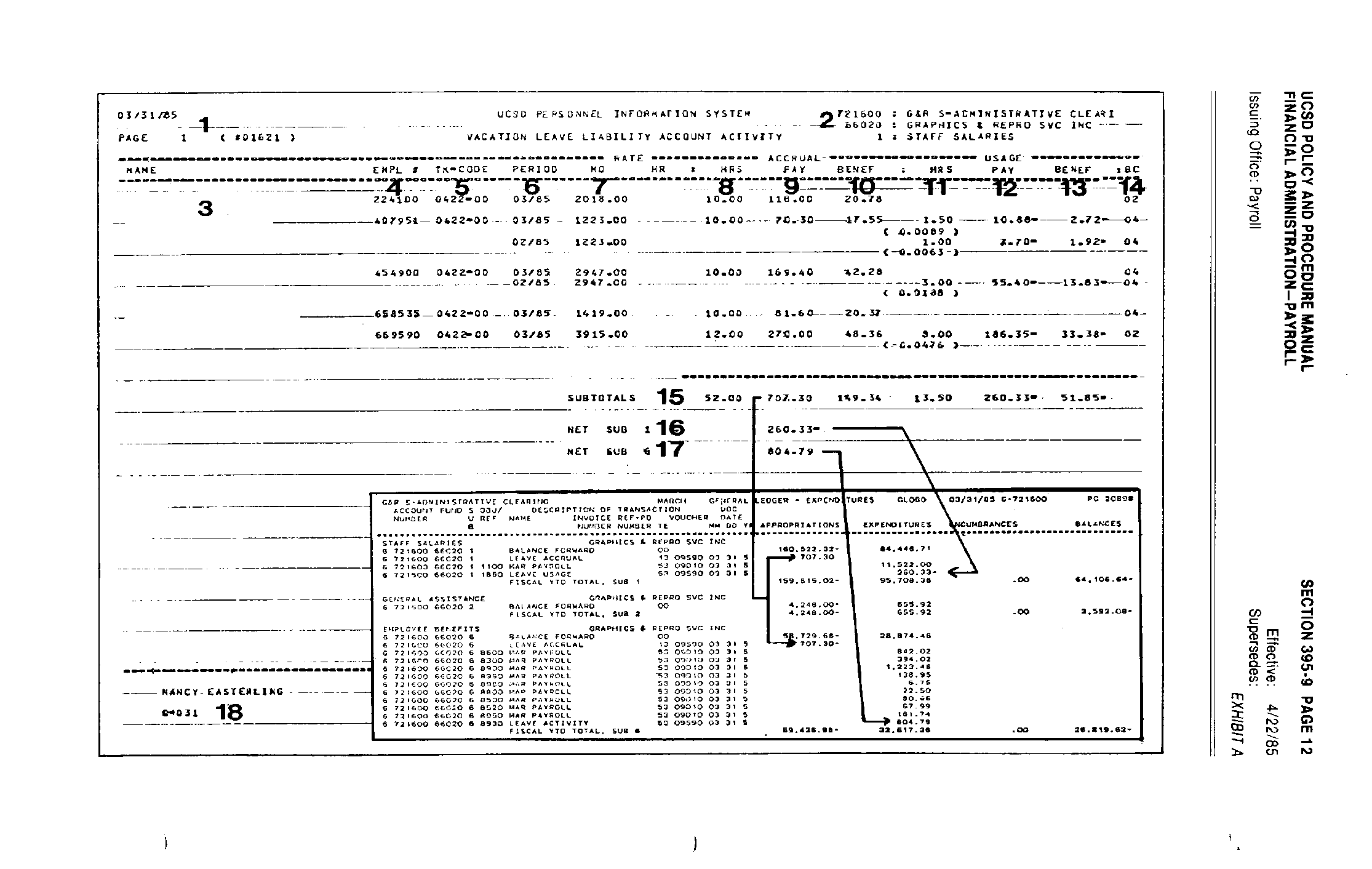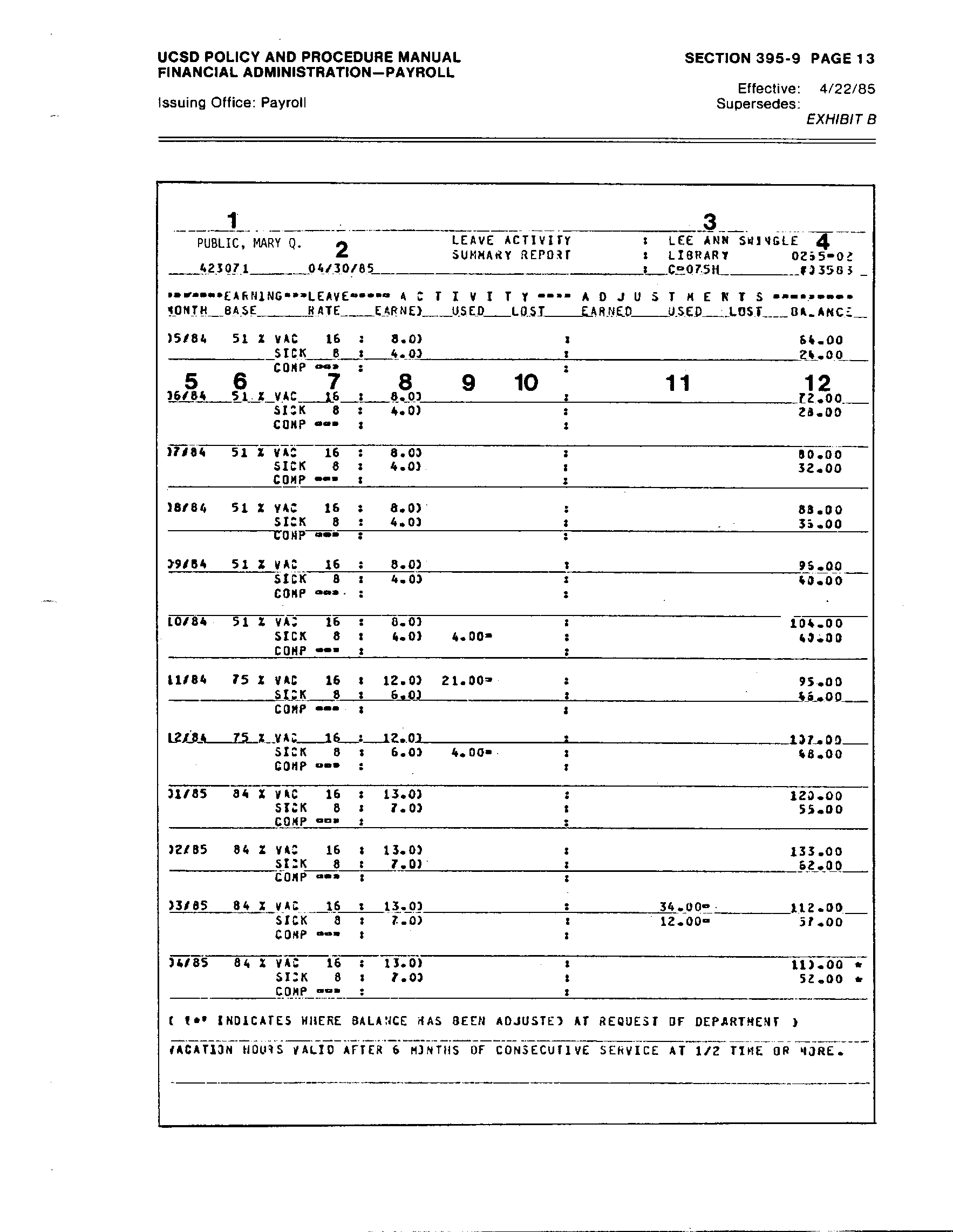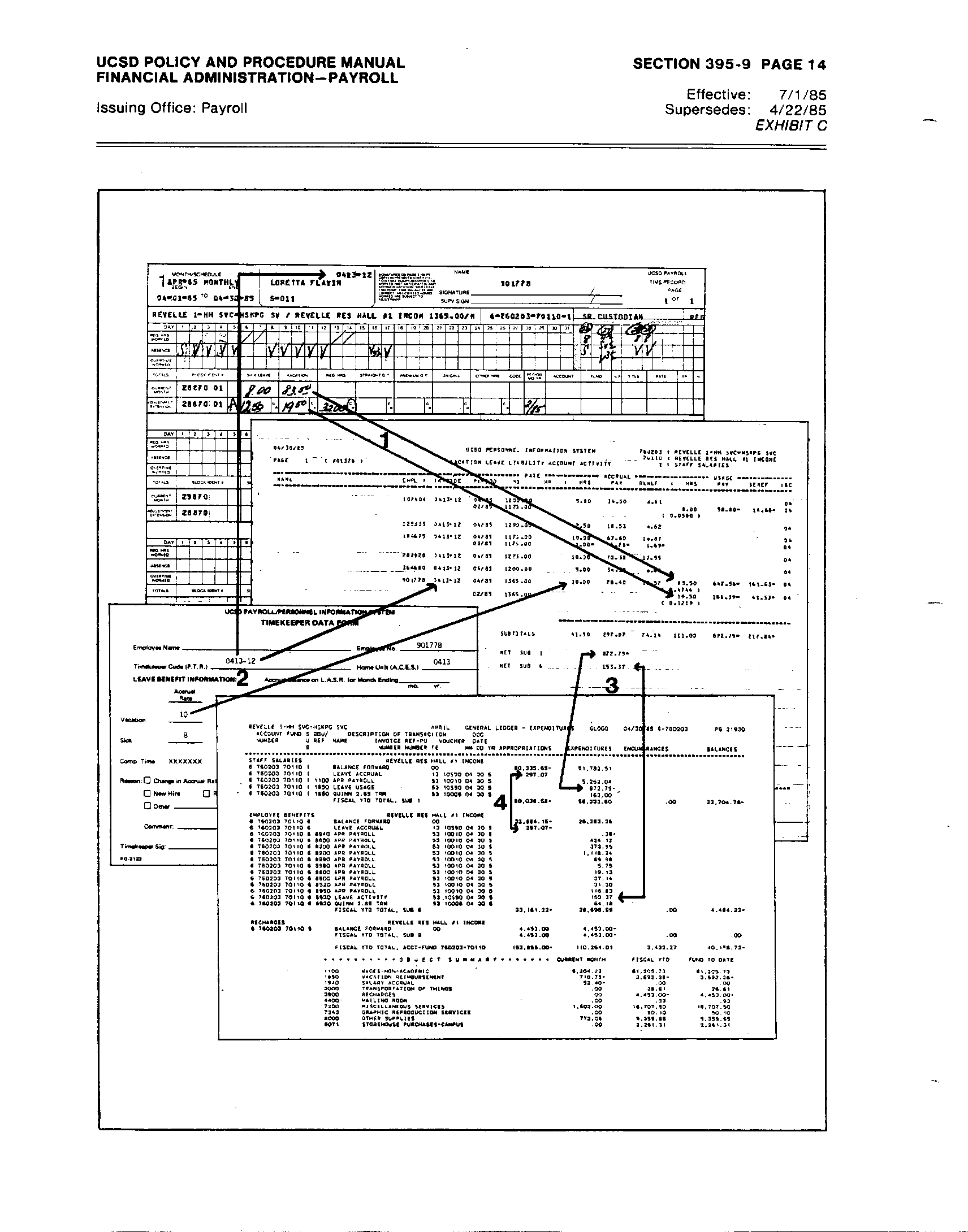Section: 395-9
Effective: 04/22/1985
Supersedes: 04/11/1977
Next Review Date: TBD
Issuance Date: 04/22/1985
Issuing Office: General Accounting Division
PPM 395-9 Exhibit A [pdf format]
PPM 395-9 Exhibit B [pdf format]
PPM 395-9 Exhibit C [pdf format]
PPM 395-9 Supplement I [pdf format]
VACATION ACCRUAL AND USAGE ACCOUNTING
REFERENCES ANS RELATED POLICIES
BACKGROUND
POLICY
PROCEDURE
Employment
Accrual Rates
Vacation Usage
Terminal Vacation Pay
VACATION LEAVE LIABILITY ACCOUNT ACTIVITY
LEAVE ACTIVITY SUMMARY REPORT (LASR)
Departmental Procedures for Verification & Distribution of LASR's
REPORT INTERACTION BETWEEN VACATION ACCOUNTING AND GENERAL LEDGER
Payroll Time Record
Timekeeper Data Form
Recording in the General Ledger
VACATION ACCOUNTING ENTRIES IN DEPARTMENTAL GENERAL LEDGERS
General/Quasi-General Funds (07427, 19900, 20000, 20095, 69750)
All Other Funds
CORRECTIONS
193-13 Payroll: Attendance, Time Reporting, and Leave Accrual Records
196-41 Employee Leave Records
730 Vacation
250-405 Vacation
395-4.1 Timekeeping: Attendance Records
395-4.2 Timekeeping: Time Reporting To Payroll
In July, 1979, the Payroll Division first began maintaining employee hours for vacation accrual and usage within the Payroll/Personnel Information System (PINS). Hours reported on the Payroll Time Record (PTR) were summarized on the following month's PTR and new leave balances were indicated. Effective May 1, 1980, prior month summarization of leave accrual balances and usage were removed from the PTR and provided to the employee on a separate Leave Activity Summary Report (LASR). The new report detailed the accrual, usage, and balances for the prior twelve months. For a detailed explanation of the LASR, please refer to PPM 395-4.1.
On October 1, 1980, the San Diego campus implemented a vacation accounting system to record vacation accruals and usage within departmental expenditure accounts. The procedure provided a systematic method to record the cost of all employees eligible to accrue vacation. The system relieved departments from having to monitor vacation reserves within various funding sources and having to submit cumbersome financial transfers when an individual is transferred to, from, or between Federal funds. In addition, departments do not suffer a severe financial hardship when employees terminate with large vacation balances.
Within the General Ledger System a vacation liability account has been established to record accruals for vacation earned and reimbursement for vacation used by each eligible employee. The liability account is maintained at an annualized near-zero balance through the use of an assessment factor which is reviewed periodically to ensure an appropriate balance. The accruals into the liability account are based upon information provided to the payroll system when departments submit Employment Certification forms. Reimbursement from the reserve for vacation usage occurs when vacation hours are included on the PTR, or, in the case of terminal vacation payoff, on the Separation Certification.
Departments are responsible for reporting leave usage and reviewing the various documents produced by the Payroll/Personnel Information System to insure that accruals and employee balances are accurate. On a monthly basis, the departments provide each employee eligible for leave usage a copy of their Leave Activity Summary Report.
Initial employment forms must include a Timekeeper Data Form (TDF) indicating the appropriate full-time accrual rate (10, 12, 13.33, 14, or 16 hours as appropriate) based on the employee's tenure and classification. Every month the system reviews the percent of time each employee has worked and calculates a prorated share of the full-time rate to arrive at the current month's accrual. These hours are then credited to the employee for usage and are used to calculate the amount of the assessment and related benefits against the funding source of the salary payment.
Staff employees with an anticipated appointment of six months or more of consecutive service will accrue vacation at the rate of 10 hours per month for full-time service. For part-time appointees working more then 50% time, vacation accrues at the proportionate rate of the full-time credit. After ten years of service, the rate is increased to 12 hours per month; after fifteen years, to 14 hours per month; and after twenty years, to the maximum rate of 16 hours per month. It is the responsibility of the departmental timekeeper to notify the Payroll Division (via TDF) when an employee reaches an anniversary that results in a change in the accrual rate.
Academic employees with eleven month appointments accrue vacation at the rate of 16 hours per month for full-time service. For part-time appointees working more than 50% time, vacation accrues at the proportionate rate of the full-time credit. (Periods of academic recess are not regarded as vacation.)
Nine month academic appointments accrue NO vacation.
Management employees accrue vacation at the rate of 16 hours per month for full-time service.
Any employee who works less than 50% time shall not accrue vacation hours.
An employee can accumulate vacation hours up to a maximum of 24 times the accrual rate.
Any hours accrued after an employee has reached maximum will appear on the LASR in both the ``earned'' column and the ``lost'' column, but will not be charged against the funding source on the Vacation Leave Liability Account Activity report.
When hours are reported retroactively for a month in which an employee lost hours due to being over the maximum accrual, the hours will be returned, but never to more than the maximum accrual balance.
Vacation usage is reported on the PTR for the appropriate time off. This creates a reimbursement to the fund source from the Vacation Reserve for salary and corresponding benefits. The reimbursement will offset the current payment for vacation in the Distribution of Payroll Expense (DOPE).
An employee who separates from University employment or who is granted extended military leave shall be paid for vacation credit accrued through the employee's last day of work. (An employee must work at least 50% of the month in order to receive any accruals for that month.) The effective date of separation shall be the last day of work, except that an employee who is retiring may use vacation up to the effective date of retirement.
An employee who is transferred, promoted, or demoted to another University position in which the employee will not be eligible to accrue vacation credit shall be paid for accrued vacation.
An employee who transfers from one accruing position with a higher accrual rate to a different accruing position with a lower accrual rate shall be paid for any hours previously accrued in excess of the maximum for the new accrual rate.
Post M.D. appointments (title codes 2708 and 2724) must take vacation during the period of residency training, and are allowed to use vacation hours before the hours are accrued. There can be no terminal vacation pay for these title codes.
Date
Indicate the month-end date for which the report was produced.
Expenditure Account
A listing of the departmental account, funding source, and appropriate salary subaccount.
Name
All employees who accrued or used vacation against the funding source are listed in employee number order.
Employee Number
The University's six-digit identifier of the employees listed in Item 3.
Timekeeper Code
The individual timekeeper code associated with the employee paid from the funding source. The codes are assigned in the Time Data Recording and Leave Accounting System (PINS II).
Period
The date associated with the accrual and/or the usage of vacation. The date can be either the current or a prior month if an adjustment has been submitted.
Rate MO/HR
The salary rate (either hourly or monthly) of the employee as it is currently established in the Payroll/Personnel System (PINS).
Accrual Hours
The number of accrued hours of vacation being charged to the funding source for an employee during a calendar month, as well as any prior pay period adjustment affecting vacation accrual. If an employee is split-funded between various funding sources, the total number of hours accrued or adjusted will be prorated to the various funding sources.
Pay
The dollar value of the accrued vacation hours. The amount is derived by multiplying hours (Item 8) by the hourly salary rate. (If the salary rate is expressed as a monthly rate, the system will divide the monthly rate by 174 to arrive at an hourly rate.)
Benefit
The value of employee benefits associated with the accrual pay in pay (Item 9). (See Item 14 for the percent factors used in the benefit charge calculation.)
Usage Hours
The number of hours reported by departmental timekeepers of vacation hours used by an employee. Also includes any adjustments to vacation usage reported on the PTR and any terminal vacation pay-off indicated on the Separation Certification. For those employees who are monthly rated, the system will equate the hours to a percent factor for that particular month which will be indicated in parenthesis under the hours reported.
Pay
The dollar value of the vacation used, determined by multiplying either the hours reported (for hourly rated employees) or the percent factor calculated in usage hours (Item 11) (for monthly rated employees) times the employee's rate of pay (Item 7). Although this figure is part of Net Sub 6 (Item 17), there is a budgetary reallocation from the appropriate salary subaccount (0, 1, or 2) into subaccount 6 in the General Ledger labeled "leave accrual".
Benefit
The dollar value of employee benefits associated with vacation pay in Item 12. (See Item 14 for percent factors used in the benefit reimbursement calculation.)
BC
The vacation accounting benefit code assigned to the individual employee. The codes represent the various combinations of employee benefits that would be applicable to either an academic, management, or staff employee (see Supplement I).
Subtotals
The total number of hours, pay, and benefits for both vacation accrual and usage.
Net Sub __ (Subaccount 0, 1, or 2)
Represents the number of dollars associated with usage pay reimbursement (Item 12) and will be the General Ledger entry into the appropriate salary subaccount with an object code of 1850 and labeled "leave usage".
Net Sub 6
The net dollar amount of the items above that affect subaccount 6. This amount is comprised of the accrual for pay and benefits which are assessed against subaccount 6 (Items 9 and 10) and the benefits associated with usage (Item 13). This amount will be entered in the General Ledger in subaccount 6 with an object code of 8930 and labeled "leave activity".
Timekeeper Address
The name and mail code of the departmental timekeeper with the preponderance of employees listed on the account/fund/subaccount.
The employee's name and University identification number will be preprinted on the LASR.
The month ending date associated with the individual LASR produced.
Timekeeper assigned to employee and campus mail code.
Timekeeper code number.
Month in which accruals were earned. (Maximum of twelve months of activity to be listed.)
Base percentage of employment to be used in calculating accruals.
Full-time rate of accrual to be used with Item 6 to calculate hours accrued.
Actual hours accrued. (Item 6 X Item 7 = Item 8.)
The hours of vacation, sick leave, or compensatory time used during the current month of the LASR as reported on the PTR(s) submitted to the Payroll Division.
The hours of vacation lost as a result of accruing more hours than the allowable maximum. (240 hrs., 288 hrs., 320 hrs., 336 hrs., or 384 hrs. as appropriate.)
The hours submitted during the current pay period affecting a prior month's balance.
The balance (in hours) of vacation, sick leave, and compensatory time for each applicable month.
The Payroll Division produces and distributes three copies of the LASR to departments after the Payroll/Personnel Information System (PINS) data base has been updated for the monthly payroll period.
Departmental timekeepers review the LASR for accuracy against the PTR that was submitted to Payroll. The balances indicated are only as accurate as the last PTR submitted to Payroll. Adjustments to projected time can be made on next month's PTR.
Departmental timekeepers should retain the top copy of the LASR for departmental records, which are subject to audit by University and/or agency auditors.
Departmental timekeepers should distribute the second copy to the employee.
The third copy is for departmental use as needed.
This section emphasizes the effect of actions performed by the department upon the financial vacation system and the resulting entries which appear in the General Ledger (see Exhibit C).
This is an example of a Payroll Time Record (PTR) with both current vacation usage and a prior pay period vacation adjustment. The hours are recorded into the system from the PTR and affect the employee's pay, leave balances on the LASR, and the financial vacation system.
The Timekeeper Data Form (TDF) generates the timekeeper code which is the basis for distribution of the Vacation Leave Liability Account Activity report. In addition, the TDF is the source of the accrual rate for vacation hours used in the calculation. It is important that the TDF be attached to all employment forms to ensure the proper accrual of vacation liability. (Employees may have prior employment with the University and their records may still contain an accrual rate that is now invalid.) This form should also be processed when the vacation accrual rate changes because of seniority within the University system, or due to a change in appointment.
Item 3 on Exhibit C indicates where the summary totals from the Vacation Leave Liability Account Activity report appear in the General Ledger. In addition to a line item appearing in the subaccount portion of the General Ledger, the amounts will also be included in the object summary using object code 1850 for salaries and object code 8930 for employee benefits.
Item 4 on Exhibit C indicates the budgetary reallocation of salaries to offset cost (or refund due to an adjustment) of the value of the vacation hours accrued.
This section describes the detailed financial and budgetary entries that appear in the General Ledger as a result of the Vacation Accounting System. It should be noted that two different recording systems will be described, one for General/Quasi-General Funds, and one for all other funds.
Vacation Accrual
When vacation is accrued, the subaccount 6 of the departmental expenditure account is assessed for the value of the vacation hours and the benefits associated with these hours.
Budgetary Offset Resulting from the Financial Accrual
Since the vacation accrual and associated benefits were assessed against subaccount 6, an automatic budgetary offset will be appropriated from the Provision for Vacation Accrual Account (802996) and credited to the subaccount 6 of the departmental expenditure account to cover the charge.
Reimbursement for Vacation Usage
When usage is reported for an employee on a PTR, the value of the pay portion is credited back directly to the expenditure salary subaccount (0, 1, or 2), with the benefits portion credited back to the expenditure subaccount 6.
Budgetary Surplus Resulting from Vacation Usage
After the expenditure account has been credited for vacation usage, an automatic budgetary entry is generated to relieve the budget (credit account 802999) in an amount equal to the financial credit received in Item 3 above.
Vacation Accrual
When vacation is accrued, the subaccount 6 of the departmental expenditure account is assessed for the value of the vacation hours and the associated benefits.
Budgetary Offset Resulting from Financial Accrual
Since the original budgetary allocation of salaries occurs within the salary and wage subaccount, an adjustment equal to the salary portion of the vacation accrual assessed must be reappropriated from the salary sub account to the employee benefit subaccount 6.
Reimbursement for Vacation Usage
When usage is reported for an employee on a PTR, and the charge has been recorded on the Distribution of Payroll Expense, the value of the salary portion of that vacation is credited back to the appropriate salary expenditure account. The value of the benefit portion of that vacation is likewise credited back to the expenditure subaccount 6.
If an error is discovered, the appropriate corrective action must be initiated by the department.
Balances can be adjusted for the current month only, therefore, any prior month corrections made to employee balances cannot be reflected retroactively in the months in which the activity occurred. Corrected balances will appear on the LASR with an asterisk (*) to the notation "indicated where balance has been adjusted at the request of the department."
EXHIBIT A

EXHIBIT B

EXHIBIT C

Supplement I
VACATION ACCRUALS & USAGE
Liability Account Activity Benefit Code (BC) |
Components |
Percentages |
|
Benefits Base for Employee in a Retirement System: |
Staff |
or Mgmt. |
|
|
10.82 |
5.92 |
|
01 |
Staff Employee Not In a Retirement System:
|
10.82 |
|
02 |
Staff Employee in PERS Retirement, Not Coordinated
|
15.24 |
|
03 |
Staff Employee in PERS Retirement, Not Coordinated
|
|
|
04 |
Employee in UCRP Retirement, NOT Coordinated With FICA:
|
15.24 |
|
05 |
Employee In PERS Retirement, Coordinated With FICA:
|
24.74 |
|
06 |
Academic Employee in UCRP Retirement, NOT Coordinated
|
9.31 |
|
07 |
Academic Employee in PERS Retirement, Not Coordinated
|
9.31 |
|
08 |
Academic Employee in UCRP Retirement, Coordinated
|
9.31 |
|
09 |
Academic Employee in PERS Retirement, Coordinated With FICA:
|
18.81 |
|
10 |
Management Employee in UCRP Retirement, Not Coordintaed With FICA:
|
9.31 0.00 ______ 9.31 |
|
11 |
Management Employee in PERS Retirement, Not Coordinated With FICA:
|
9.31 9.50 ______ 18.81 |
|
12 |
Management Employee in UCRP Retirement, Not Coordinated With FICA:
|
9.31 7.65 ______ 16.96 |
|
13 |
Management Employee in PERS Retirement, Coordinated With FICA:
|
18.81 7.65 ______ 26.46 |
|
14 |
Research Assistant (Title Codes 1506, 2310, 3275, 3299) Benefit Rate:
|
1.82 |
|
15 |
Staff Employee in UCRS/Safety Retirement(Title Codes 5310, 5312, 5313, 5323) Not Coordinated With FICA:
|
15.24 0.00 ______ 15.24 |
|
30 |
Terminal Vacation Pay
|
1.82 .14 ______ 1.96 |
|
31 |
Terminal Vacation Pay
|
1.82 .14 7.65 ______ 9.61 |
* Note: Benefit Base rates are taken from those prescribed for contract and grant proposals.
